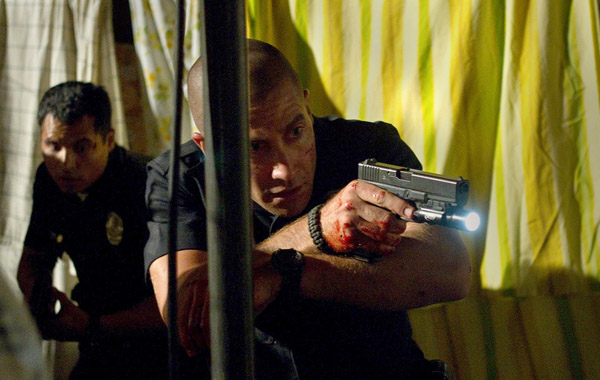An ode to beat cops and the expansive literature on them, David Ayer’s “End of Watch” is a muscular, maddening exploitation movie embellished with art-house style and anchored by solid performances. As visually kinetic as it is politically dubious, it sings the song of two Los Angeles police officers, Brian (a good Jake Gyllenhaal) and Mike (an equally fine Michael Peña), brothers in blue who roll in a black and white. Like the cops in Joseph Wambaugh’s 1970 novel “The New Centurions” they are soldiers amid, in Mr. Wambaugh’s roll call, “whores, flimflammers, paddy hustlers, hugger muggers, ex-cons of all descriptions, and anybody else with a kink of some kind or other.”
|
Cops Who Tote Guns and Video Cameras
Posted on: 09/21/12
‘End of Watch,’ With Jake Gyllenhaal and Michael Peña The villains in “End of Watch” are less flamboyantly diverse (and quaint sounding) than those rattling around “The New Centurions.” Here the baddies are primarily Latino gangbangers (and their cartel masters), men and women with neck tattoos, dead eyes and names as blunt as their violence: Demon, Wicked, Big Evil. Their ethnicity partly reflects changes to the neighborhood that the cops patrol, identified in the movie as South Central, but since 2003 officially known as South Los Angeles. The new name was an attempt to distance the area from the civil disobedience that has convulsed the city and the more localized violence that, depending on your take, has been immortalized or exploited in films like“Training Day,” which Mr. Ayer wrote. As with “Training Day” this movie pivots on a fundamentally decent cop, Brian, who endures a crucible of violence and experiences something of a moral education. A former Marine (Mr. Ayer was in the Navy), Brian is ambitious and taking prelaw classes for which he’s making an epically long video. This plot device allows Mr. Ayer to tell the story through Brian’s hand-held camera, the mini-cameras he pins to his and Mike’s uniforms, the surveillance camera in their squad car and images shot by other characters, including the gangbangers. Mr. Ayer was clearly after a hyper-verisimilitude of the sort deployed in some contemporary horror flicks, an unmediated realism that’s meant to suggest the truth of the image but, as it does here, only confirms its entertaining artifice. Mr. Ayer has said he wanted “End of Watch” to look like something on YouTube; happily, it just looks and plays like a mainstream multi-act movie with a lot of super-shaky, run-and-gun imagery. After a while Mr. Ayer’s visual gimmickry calms down or simply ceases to distract as the episodic story takes Brian and Mike from the city’s mean streets to their homes and women, Janet (Anna Kendrick, sexily cast against type), and Gabby (Natalie Martinez). The women are unsurprisingly secondary figures, although each puts in quality domestic time with the guys. There are also a pair of tough-chick cops (America Ferrera and Cody Horn), and their rabidly violent gangbanging counterpart (Yahira Garcia). Mostly, though, this is about men loving each other and fighting the evil that other men do. Some of that wickedness is grimly familiar from the news and other films, and almost all of it is committed by the black and mainly brown people on the other side of the blue line. Mr. Peña’s sympathetic performance and likable character help keep the movie from coming across as a kind of freakout over the specter of a Latino Nation. At the same time Mr. Ayer exhibits a curious nostalgia for the hood’s good old bad and blacker days, notably in the use of a Public Enemy song and a scene in which a middle-aged African-American tough (a vivid Cle Sloan) favorably compares the cops to original gangsters. It’s a moment that registers as a plea for authenticity, although less on behalf of the characters than the director. End of Watch Opens on Friday nationwide. Written and directed by David Ayer; director of photography, Roman Vasyanov; edited by Dody Dorn; music by David S. Sardy; production design by Devorah Herbert; costumes by Mary Claire Hannan; produced by John Lesher, Nigel Sinclair and Matt Jackson; released by Open Road Films. Running time: 1 hour 48 minutes. WITH: Jake Gyllenhaal (Officer Brian Taylor), Michael Peña (Officer Mike Zavala), America Ferrera (Officer Orozco), Anna Kendrick (Janet), Natalie Martinez (Mrs. Zavala), Frank Grillo (Sarge), Cody Horn (Officer Davis), Cle Sloan (Mr. Tre) and Yahira Garcia (La La). COMMENTS
Be the first to post a comment! Post A Comment:

|
.gif)



.jpg)

